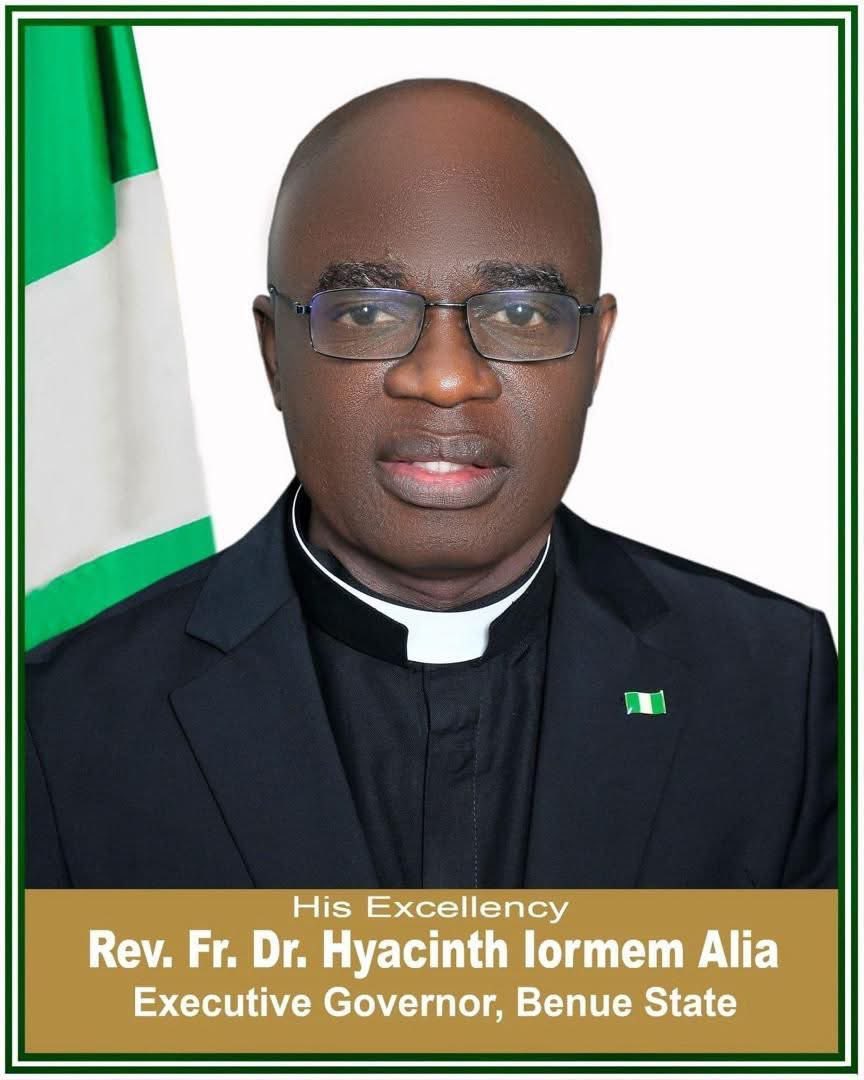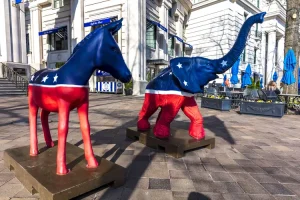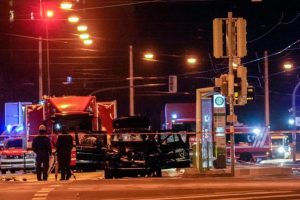I Can’t Guarantee Safety of Anyone Visiting Benue Without My Knowledge” – Governor Alia Warns Amid Rising Political Tensions
Benue State, long considered the food basket of the nation, has again become the focal point of national attention—this time not for its agricultural bounty, but for a tense political standoff involving its governor, Reverend Father Hyacinth Alia, and leading opposition voices, particularly former presidential candidate Mr. Peter Obi of the Labour Party.
In a statement issued on Monday, April 14, 2025, the Benue State Government declared that it could not guarantee the safety of anyone visiting the state without the prior knowledge and approval of the governor. The message, conveyed through the governor’s Chief Press Secretary, Mr. Tersoo Kula, and titled “Notice Regarding Unscheduled Visit to Benue State,” triggered immediate national concern, sharp reactions, and intense public debate.
The blunt declaration, interpreted by many as an implicit warning to political rivals and potential visitors, has been widely viewed as a politicization of access to public spaces and humanitarian zones, particularly Internally Displaced Persons (IDPs) camps. Others, however, defend the governor’s position as a security necessity in an era of rampant insecurity and political tension.
YOU MAY READ
May God Help Us As We Aim to Achieve a New Nigeria Where We Do Not Politicize Everything”: Peter Obi Speaks After His Humanitarian Visit to Benue State Was Blocked
The official statement released from Makurdi was unambiguous in its tone and content. It read:
“The Governor of Benue State, Rev. Fr. Hyacinth Alia, wishes to inform the public that he is not expecting any August visitor to the state today. He is currently engaged in high-profile meetings with key state actors to discuss critical issues affecting our state.”
“Therefore, he strongly advises against any group or high-profile individual(s) attempting to enter the state for any kind of visit that may generate political assemblies without prior approval. For anyone considering a visit to Benue State without the Governor’s knowledge, it is imperative to reconsider such plans, as the safety and security of individuals in this regard cannot be guaranteed.”
The governor further emphasized that any visitation, especially to sensitive areas such as IDP camps, required official clearance from the Benue State Emergency Management Agency (BSEMA).
The statement did not mention names, but many observers connected it to the recent events surrounding Mr. Peter Obi’s attempted humanitarian visit to the state.
Only hours before the governor’s statement, Mr. Peter Obi, former Governor of Anambra State and the 2023 presidential candidate of the Labour Party, publicly decried being blocked from visiting Benue for humanitarian purposes. Obi had planned visits to Plateau and Benue States, intending to pay courtesy calls to their governors and visit IDP camps and health institutions to offer support.
In his own statement, Obi revealed he had tried to reach Governor Alia but failed. He also claimed to have received a government-issued press release aimed at stopping his journey while en route to Benue. His emotional response concluded with the now-viral quote: “May God help us as we aim to achieve a new Nigeria where we do not politicize everything.”
The alignment in timing, message, and tone left little doubt that Governor Alia’s warning was, at least in part, directed at Obi or other political figures who might attempt visits without gubernatorial consent.
YOU MAY READ
PURPORTED REMOVAL OF CHIEF JUDGE OF BENUE STATE: A BRAZEN ASSAULT ON THE CONSTITUTION
Governor Alia’s declaration quickly ignited a flurry of legal and constitutional debate across the country. Critics questioned whether a state governor had the legal authority to restrict freedom of movement within the Federal Republic of Nigeria, particularly when the visitor in question is a high-profile citizen with no criminal record and a demonstrable history of humanitarian work.
Barrister Abdulraheem Lawal, a constitutional lawyer based in Abuja, argued that while governors have a role in maintaining public order, their powers are not absolute.
“The right to freedom of movement is enshrined in Section 41 of the Nigerian Constitution,” he said. “Unless there is a declared state of emergency or a lawful security advisory, no governor can restrict lawful citizens from entering a state.”
The Nigerian Human Rights Commission (NHRC) also expressed concern, calling on the Benue State Government to clarify the legal basis of the warning and assure the public that IDP camps remain open to legitimate humanitarian efforts.
Many political analysts believe the governor’s statement signals the deepening of hostilities between ruling parties at the state level and opposition leaders seeking relevance and public goodwill through grassroots engagement.
YOU MAY READ
NBA Relocates 2025 Annual General Conference to Enugu Over Constitutional Crisis in Rivers State
While Alia, elected on the platform of the All Progressives Congress (APC), has been credited with attempting infrastructural revamps and administrative reforms, his critics accuse him of closing the political space and undermining democratic inclusivity.
Dr. Ifeanyi Ugwoke, a political analyst at the University of Nigeria, Nsukka, views the statement as “a troubling overreach.”
“Governors must not become gatekeepers of compassion. To suggest that people cannot visit vulnerable citizens unless they obtain written approval reduces humanitarianism to bureaucracy and political patronage,” he warned.
Peter Obi’s Labour Party has also weighed in, condemning the move as part of a broader scheme to stifle opposition voices in the Middle Belt.
“This is not about Peter Obi. This is about a political culture that prioritizes power over people,” said Kenneth Okonkwo, a spokesperson for the party. “We must resist any attempt to make public institutions fiefdoms controlled by fear.”
However, supporters of Governor Alia argue that the state’s precarious security situation justifies heightened caution. Benue State has long been plagued by violence stemming from herders-farmers clashes, armed banditry, and internal political tensions.
Mr. Emmanuel Iorver, a public affairs commentator and supporter of the governor, defended the decision.
“This is not about politics. Governor Alia is simply being proactive. The last thing we need is for an uncoordinated visit to spark unrest, especially in IDP camps where tensions are high and trauma is fresh,” he argued.
Others believe Alia’s statement, while harsh in tone, reflects a legitimate attempt to maintain public order in an environment where any gathering can quickly escalate.
One of the most troubling aspects of the governor’s position is the potential chilling effect it could have on humanitarian efforts within the state. Benue is currently home to over 2 million internally displaced persons, many of whom rely on non-governmental organizations, religious groups, and philanthropic individuals for food, shelter, and medical support.
Dr. Ladi Jemima, a humanitarian worker with an international NGO operating in Makurdi, described the governor’s pronouncement as “devastating.”
“We’ve always coordinated with BSEMA, but the process is already cumbersome. If we now need political approval just to deliver food or medicine, it will paralyze our operations and hurt the people we serve,” she said.
She also questioned whether the order applies equally to foreign delegations and faith-based organizations known to carry out extensive charity work in the region.
YOU MAY READ
We Heard Gunshots on Our Farm Around 2 PM; My Only Son Was Shot Dead – Enugu Widow Recounts How Fulani Herdsmen Killed University Graduate in Fresh
Attack
The Nigerian public has reacted to Governor Alia’s statement with a mix of anger, confusion, and even satire. On X (formerly Twitter), hashtags such as #AliaGate, #BenueLockdown, and #IDPsAreNotPolitical began trending by midday on April 14.
Activists and civil society organizations condemned what they described as a dangerous precedent. Some called for a national conversation on the limits of executive power at the state level. Others shared pictures and videos of their past unannounced visits to IDP camps, asking whether they, too, should have sought permission.
Meanwhile, satirical memes emerged depicting fictional “Benue Visa Application Forms,” poking fun at the idea that a Nigerian citizen would need permission to visit fellow citizens.
This episode adds to the growing political tension in Nigeria’s Middle Belt, a region increasingly seen as the new battleground for political influence, humanitarian challenges, and ethnic contestations. With its diverse population, vast natural resources, and strategic location, Benue State stands at the heart of these dynamics.
Governor Alia, elected with high hopes in 2023, now faces increasing scrutiny over his administrative style, especially his approach to political opposition. Critics say his tendency to centralize authority and deploy state power selectively is creating unnecessary divisions.
But the governor’s inner circle remains adamant: his primary concern is the safety of the people and the preservation of law and order.
The way forward from this political impasse requires leadership, humility, and a recommitment to constitutional principles. Both Peter Obi and Governor Alia have strong followings and command significant respect. Their clash, however unintended, risks setting a precedent where humanitarian outreach is viewed as political intrusion.
Already, civil society groups are calling for a national framework governing visits to IDP camps to prevent future politicization. Others suggest a code of conduct for political leaders engaging in post-election goodwill tours.
Above all, what this episode reveals is the urgent need for reconciliation in Nigeria’s fractured polity. As the nation grapples with inflation, insecurity, and a cost-of-living crisis, the people yearn for unity, not rivalry; collaboration, not confrontation.
Governor Alia’s statement may have been meant as a protective measure, but its implications go far beyond Benue’s borders. It touches on the delicate balance between governance and rights, between state control and individual freedoms, and between political authority and moral responsibility.
As Nigeria’s democracy matures, its leaders must show greater restraint, tolerance, and foresight. Blocking a humanitarian visit, especially one aimed at alleviating suffering, sends a dangerous signal—not just to political opponents, but to the citizens watching closely.
In the end, both Peter Obi’s message and Governor Alia’s response form part of a broader conversation about what kind of nation Nigeria wants to become—a place where power is hoarded and kindness is politicized, or a land where leaders welcome support regardless of where it comes from.
The choice, as always, belongs to the people.





